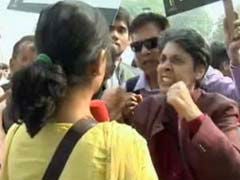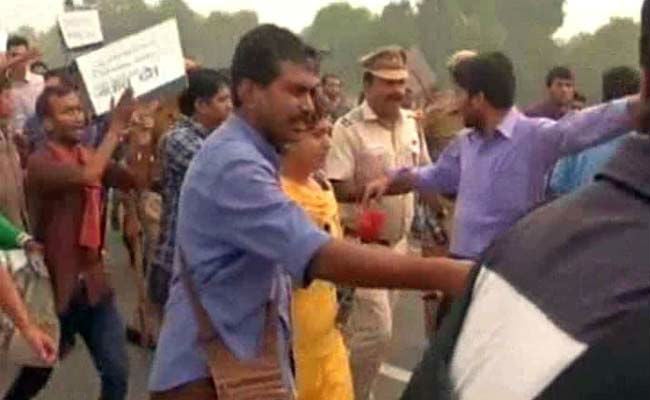Female reporter heckled and 'called prostitute' at rally intended to show India's tolerance
India is grappling with allegations that the country has become increasingly intolerant under Narendra Modi

Your support helps us to tell the story
From reproductive rights to climate change to Big Tech, The Independent is on the ground when the story is developing. Whether it's investigating the financials of Elon Musk's pro-Trump PAC or producing our latest documentary, 'The A Word', which shines a light on the American women fighting for reproductive rights, we know how important it is to parse out the facts from the messaging.
At such a critical moment in US history, we need reporters on the ground. Your donation allows us to keep sending journalists to speak to both sides of the story.
The Independent is trusted by Americans across the entire political spectrum. And unlike many other quality news outlets, we choose not to lock Americans out of our reporting and analysis with paywalls. We believe quality journalism should be available to everyone, paid for by those who can afford it.
Your support makes all the difference.A leading Bollywood actor has issued an apology after a female television journalist was apparently heckled and abused at a rally he had organised to promote tolerance and unity.
Anupam Kher had organised the so-called March For India, amid allegations that the country has become increasingly intolerant since Narendra Modi was elected Prime Minister in May 2014.
A number of leading artists and writers have returned national awards and honours to highlight what they believe is a growing wave of intolerance. Mr Kher had in turn called for people to join him to stop people using “selective outrage” to damage India’s reputation.
“Nobody has the right to call our country intolerant. We are secular people and don't believe in selective outrage,” Mr Kher said.
Yet, police were forced to intervene and come to the rescue of a television reporter and her crew after they were apparently abused and harassed by elements within the crowd.
Bhairavi Singh of NDTV said she was heckled, called a “prostitute” and chased, while completing her report. Strident supporters of Mr Modi have in the past accused NDTV of being biased towards the rival Congress party, a charge the network has rejected. Ms Singh could not be immediatey contacted on Saturday.
“First was called a prostitute, heckled, chased just for saying that the Indian creative world is divided on this issue,” Ms Singh wrote on Twitter.
“Shaken, scared by goons who didn't understand a word of what I said at the march.”
Mr Kher, who has appeared in dozens of Indian language films and in Western productions such as Silver Linings Playbook and Bend it Like Beckham, issued an apology to any journalists who were hurt at his event.
“If any individual did this during the rally, I apologise,” he said.

The march to the presidential palace, where Mr Kher said he planned to meet with President Pranab Mukherjee and later with Mr Modi, came amid a national debate within India about the issue of tolerance.
Since securing its independence from Britain in 1947, India has - with the exception of the 21-month state of emergency imposed by Indira Gandhi in 1975 - been proud of its democratic history. A nation with a dizzying number of religions, ethnicities and languages, it has also worked - if with somewhat imperfect results - towards an ideal of tolerance and inclusion.
The criticism of Mr Modi, who as chief minister of Gujarat was accused of discriminating against Muslims and of allowing the slaughter of several thousand in a 2002 massacre, comes as the Indian Prime Minister is set to arrive in the UK. Mr Modi has been cleared of any wrong-doing by at least one judicial probe.
Britain - which for a decade boycotted Mr Modi because of the Gujarat killings - has been keen to secure a visit from him since he was elected.
David Cameron has long claimed the UK and India ought to be natural partners. Yet, these days India and its tough-talking leader has lots of suitors and Britain’s approach to Delhi has at times combined clumsiness and arrogance.
In the summer of 2013, there was an angry backlash to plans announced by the British government to introduce £3,000 bonds for visitors from six countries - including India - which were deemed to be “high-risk”. The plan was eventually dropped.
Join our commenting forum
Join thought-provoking conversations, follow other Independent readers and see their replies
Comments